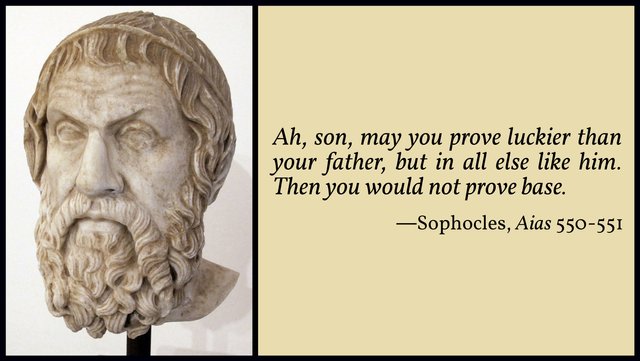
During his two years in Geneva (1572-74), Joseph Juste Scaliger undertook several philological projects. One of these, his study of the Astronomica by Marcus Manilius, would not be ready for the printer until 1579. Of the others, the first to be completed was an edition of the works of Decimius Magnus Ausonius, a Roman poet and teacher of rhetoric who flourished in the 4th century of the Common Era. But before either of these appeared in print a much earlier work of Scaliger’s passed through the press: his youthful translation of Sophocles’ tragedy Aias—or Ajax, as it is commonly known in English.
Aias is thought to be the earliest of Sophocles’ seven extant tragedies, dating from the 440s bce. It recounts the fate of the Greek warrior Ajax the Great in the immediate aftermath of the Fall of Troy. The Argument to the play in Richard Claverhouse Jebb’s translation reads as follows:
After the death of Achilles in the war at Troy, Ajax and Odysseus were rivals for the honour of inheriting his armour. The Greek chiefs, with the two Atreidae at their head, were the judges; and they awarded the prize to Odysseus. Distempered in mind by his rejection, Ajax went out at night with the purpose of slaying Agamemnon and Menelaus. He was at the very doors of their quarters, when Athena, whom he had angered in past days, smote him with raging madness. He fell on the flocks and herds of the Greek army, fancying that they were his human foes; cut down the shepherds and herdsmen, slaughtered numbers of the animals, and led others captive to his tent.
When the drama begins, it is early on the morning after this midnight raid. Rumour already points to the son of Telamon as the author of the outrage, Odysseus, acting on the hint of an informant who had caught a glimpse of the maniac, has followed up the tracks which he found in the plain; and these have led him to the tent of Ajax, He is now closely scanning the footprints near it, in order to judge whether Ajax is still within the tent, or has again gone forth. While thus engaged, he hears the voice of his guardian goddess. (Jebb 174)

Scaliger’s Aias
Scaliger’s Latin translation of the Ancient Greek is thought to date from around 1565, when Scaliger was in his mid twenties. Between 1563 and 1567, he and his noble patron Louis Chasteigner undertook a Grand Tour, in the course of which they visited Italy, England, and Scotland. The precise date of the work is not known, but Anthony Grafton is confident that it was made sometime before Scaliger left Italy:
The exact dating of the version is unclear. One of the poems in honour of Scaliger by J. Gardesius with which the work concludes is headed ‛Eiusdem in eundem, qui Lycophronis Cassandram, Aeschyli Eumenidas, ac postremo Sophoclis Aiacem Latinis versibus transtulit’ [‛The same man who translated Lycophron’s Cassandra, Aeschylus’ Eumenides, and finally Sophocles’ Ajax into Latin verse’] (p. 102); this shows that 1564 must be the terminus post quem. But in Scaligerana II, s.v. Muret, pp. 464-5, Scaliger writes: ‛O que Muret a mesdit de mon Ajax Lorarius! Il s’en est tant mocqué; c’estoit un grand homme, il faut bien qu’il y ait veu quelque chose que je n’y ay pas veu ...’. [‛O how Muret disparaged my Ajax Lorarius! He made so much fun of it; but he was a great man, so he must have seen something there that I did not ...’.] This suggests that the two men discussed the version; and that could only have happened during Scaliger’s Italian tours of 1565 and 1566. Given the work’s close similarity to Scaliger’s other enterprises of the mid-1560s, I have tentatively assigned it to the same period. (Grafton 280 fn 73)
Scaliger is known to have collaborated with Willem Canter on an edition of Lycophron’s Cassandra around 1564, although it was not published until 1566 (Grafton 280 fn 70). Scaliger’s Latin translation of Aeschylus’ Eumenides has been lost. Scaliger met the French humanist Marc Antoine Muret in Rome, where Muret’s lectures on Latin literature and rhetoric at the Sapienza University won for him a wide reputation.
Eight years earlier, when Scaliger was just sixteen and studying with his father at his native Agen, he had composed a Latin tragedy on the myth of Oedipus—possibly inspired by Sophocles’ famous tragedy Oedipus Rex. It has not survived.

Sophocles’ Aias and Scaliger’s translation of it were published by Jean Bienné (Joannes Benenatus) in Paris in 1573 under the title:
The circumstances which led Scaliger to dust off this old work and have it published at this time are not known. The following year, the translation alone appeared as an appendix to a collected edition of the poems of Scaliger’s father Julius Caesar Scaliger (Jacob Stoer, Geneva).
In Latin, the word lorarius denoted a flogger or chastiser, one who scourged slaves with thongs. Although Sophocles simply called his play Αἴας [Aias], the longer form Ajax Lorarius was once commonly used for Latin editions. It refers to the famous episode before the play begins when Ajax slaughters the army’s sheep and cattle and their herdsmen, mistaking them in his madness for his fellow Achaeans.
Scaliger’s Latin
Scaliger’s Latin translation is far from orthordox:
Here too Scaliger’s aim was clearly to write archaic Latin. He used as many arcane or distinctively pre- classical words as possible: obgannuit, ninguida, salisubsuli He dressed ordinary words in primitive spellings: ast, maxumus, advorsum, parvolum. And, like the archaic poets, he freely coined new compound words—while avoiding those compounds that had also been used by classical and post-classical poets ... Sometimes the effects of this method are merely curious ... Sometimes they are unintentionally comic ... (Grafton 114-115)

Muret’s reaction is understandable. And Scaliger’s adoption of this archaic style is all the more surprising, given his appraisal of Sophocles as a sober-minded and temperate writer:
Scaliger himself, echoing ancient critical opinion, prized Sophocles especially because he was so sanus and sobrius. That he still saw archaic Latin as the appropriate medium for his version is all the more revealing. (Grafton 115)
Scaliger never lost his love for what his pupil Daniel Heinsius later called the grace and charming squalor of pristine antiquity (Grafton 116 : Heinsius 185-186).
References
- Pierre Desmaizeaux (editor), Scaligerana, Thuana, Perroniana, Pithoeana, et Columesiana, Volume 2, Prima Scaligerana, Secunda Scaligerana, Covens & Mortier, Amsterdam (1740)
- Anthony Grafton, Joseph Scaliger: A Study in the History of Classical Scholarship, Volume 1, Textual Criticism and Exegesis, Clarendon Press, Oxford (1983)
- Daniel Heinsius, De Tragoediae Constitutione Liber, Johannes Balduinus [Jan Bouwensz], Leiden (1611)
- Richard Claverhouse Jebb (translator), The Tragedies of Sophocles, Cambridge University Press, Cambridge (1904)
- Joseph Juste Scaliger, Sophoclis Aiax Lorarius, Sophocles’ Aias, Edited and with a Latin Translation in the Tragic Style, J Benenatum, Paris (1573)
- Joseph Juste Scaliger, Sophoclis Aiax Lorarius, Sophocles’ Aias, Edited and with a Latin Translation in the Tragic Style, Appendix to Joseph Scaliger, The Poems of Julius Caesar Scaliger, Jacob Stoer, Geneva (1574)
Image Credits
- Joseph Juste Scaliger: Nicolas Eustache Maurin (painter), François-Séraphin Delpech (engraver), Bibliothèque de Genève, Public Domain
- The Death of Ajax: Antonio Zanchi (artist), Private Collection, Public Domain
- Marc Antoine Muret: Anonymous Copper Engraving, Herzog August Library, Wolfenbüttel, Germany, Public Domain
- Sophocles: Anonymous Bust of Sophocles, 1st-Century CE Replica of a 4th-Century BCE Greek Original, National Archaeological Museum, Naples, Sailko (photographer), Public Domain
Online Resources
- The Warburg Institute
- Leiden University Libraries
- Jacob Bernays: Joseph Justus Scaliger
- Jacob Bernays: Joseph Justus Scaliger
- Autobiographical Extracts
